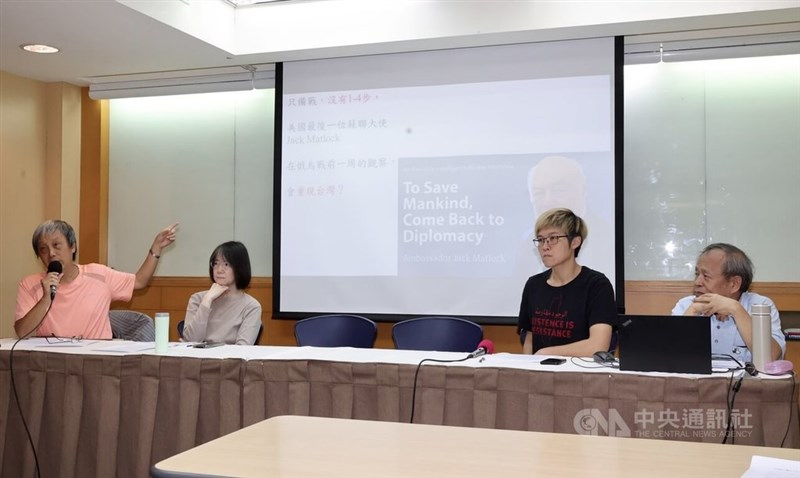A group of 75 scholars has issued a strong rebuke of Taiwanese President Lai Ching-te’s (賴清德) recent policies, accusing him of using populism to rally supporters while simultaneously undermining free speech in the country. The scholars warned that Taiwan’s democracy is under threat due to an increasing wave of ideological censorship and heightened tensions in cross-strait relations.
Their concerns, detailed in a public statement titled “Defending Taiwan’s Democracy, Rule of Law, and Peace,” highlight fears that the government’s intensified anti-China stance is leading to political tightening, echoing restrictions last seen during Taiwan’s martial law era.
Scholars’ Concerns: Erosion of Free Speech and Political Tightening
Led by Academia Sinica academician Chen Pei-jer (陳培哲), the scholars emphasized that recent government actions have damaged Taiwan’s democracy and rule of law. They cited President Lai’s labeling of China as a “foreign adversary” and the announcement of 17 new strategies to counter Beijing’s coercion as examples of the administration’s hardline approach.
In their statement, the scholars warned that:
- Taiwan is experiencing increasing ideological censorship, restricting academic freedom and public discourse.
- The Democratic Progressive Party (DPP) is leveraging anti-China sentiment for political gain, which could backfire in the long run.
- Cross-strait relations are deteriorating, making peace and stability more difficult to maintain.
“We strongly feel that Taiwan’s democracy and rule of law are facing unprecedented damage and threats due to the Democratic Progressive Party’s new wave of anti-China sentiment,” the statement read.
The group urged the government to stop exploiting nationalist sentiment and instead pursue a more rational and constructive approach toward China.
Lai’s 17 Strategies and Their Controversy
President Lai’s 17 strategies, announced just before the 20th anniversary of China’s Anti-Secession Law, aim to counter Beijing’s threats by strengthening Taiwan’s defenses. These measures include:
- Reinstating military courts for cases involving espionage and national security threats.
- Stricter oversight of cross-strait academic and cultural exchanges.
- Expanded military preparedness, including bolstered cybersecurity and intelligence gathering.
- Economic diversification to reduce reliance on China.
However, critics argue that these measures could lead to:
- Overreach in security laws, potentially being used to silence political opponents.
- Restrictions on academic collaboration, limiting Taiwan’s global influence.
- Increased tension with China, escalating the risk of economic and military confrontation.
Expulsion of Chinese Spouse Sparks Backlash
One of the most controversial incidents reinforcing scholars’ concerns was the expulsion of Liu Zhenya (劉振亞), a Chinese spouse residing in Taiwan. Liu, who posted videos online advocating for China’s military unification of Taiwan, had her dependent-based residence permit revoked and was deported.
Supporters of the government argue that Liu’s content constituted a national security threat and that her expulsion was justified under Taiwan’s Anti-Infiltration Act. The Mainland Affairs Council (MAC) stated that China’s psychological and military intimidation of Taiwan aligns with the definition of a “foreign adversary,” justifying such measures.
However, critics, including the scholars, warn that this could set a dangerous precedent for cracking down on political speech, even when it does not directly incite violence.
Government and Opposition Responses
Presidential Office: Defends Free Speech, But Draws a Red Line
Responding to the scholars’ statement, Presidential Office spokesperson Karen Kuo (郭雅慧) asserted that Taiwan remains committed to free speech. However, she emphasized that advocacy for aggression, violence, or acts that endanger Taiwan’s sovereignty crosses the line of acceptable discourse.
“Taiwan is a democratic society where freedom and democracy are the foundation of the nation,” Kuo said, while warning that certain expressions could constitute security threats.
Opposition Kuomintang (KMT) Supports the Scholars
In contrast, the opposition Kuomintang (KMT) sided with the scholars, expressing concerns over potential government overreach.
KMT spokesperson Crystal Yang (楊智伃) stated:
- The government must respect academic freedom and differing opinions.
- Taiwan should not return to authoritarian-style restrictions on speech.
- The scholars may face online harassment or government retaliation for their criticism.
The KMT accused the DPP of using national security concerns as a political weapon to suppress dissent.
Conclusion: A Turning Point for Taiwan’s Democracy?
The growing tension between national security concerns and democratic freedoms is shaping up to be a major political issue in Taiwan. With President Lai doubling down on anti-China policies, scholars and opposition figures warn that the government must be careful not to sacrifice Taiwan’s hard-earned democratic values in the process.
The coming months will be critical in determining whether Taiwan’s leadership can balance security and free speech or if this dispute signals a deeper shift toward government control over political discourse.
FAQs
What is the controversy surrounding President Lai’s policies?
President Lai’s 17 strategies to counter China have sparked debate, with scholars arguing that they erode free speech and democracy while increasing tensions with Beijing.
Why are scholars accusing the DPP of using populism?
They claim that the DPP is leveraging anti-China sentiment for political gain, leading to political tightening and restrictions on academic and public discourse.
What are the main concerns regarding free speech?
Scholars fear ideological censorship, increased surveillance, and political retaliation against those who criticize the government’s policies.
Why was Chinese spouse Liu Zhenya expelled from Taiwan?
Liu posted pro-China military unification content online, which led authorities to revoke her residency permit on national security grounds.
What is the government’s justification for these measures?
The Presidential Office argues that while free speech is protected, advocacy for aggression and violence against Taiwan crosses a red line.


